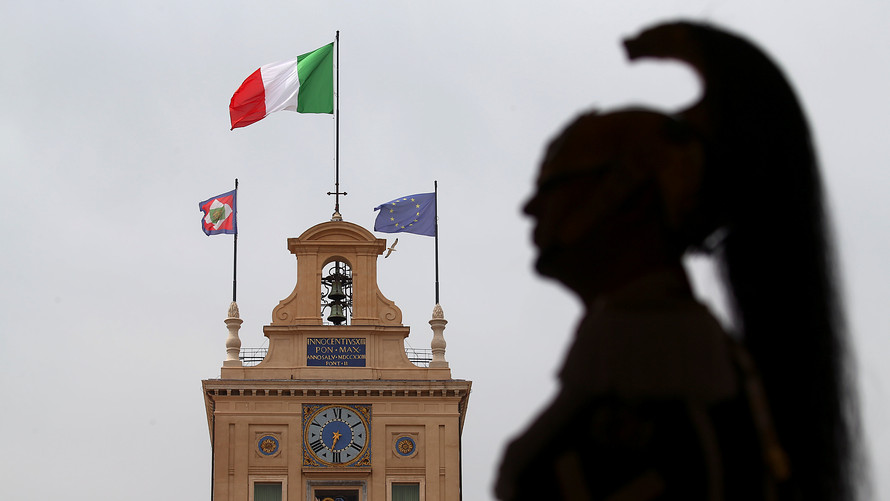
Italy’s stocks have gone on sale, thanks to the country’s latest political drama, but they haven’t necessarily become a great bargain.
When it comes to buying the dip, a bunch of strategists are saying, “No, grazie.”
A big issue for bears is that while Italy’s FTSE MIB equity benchmark I945, +1.49% has dived over the past month, the drop followed a year-and-a-half-long rally that had delivered a gain of more than 40%.
“Risk-reward going forward is weaker, given the strong run and the rising political overhang,” say JPMorgan strategists, led by Mislav Matejka, in a recent note. They have recommended taking profits on Italian stocks and instead rotating into German equities.
In like vein, strategists at Société Générale note that, if investors look back to 2016, rather than to just a month ago, the Italian market is not the steal it once was. It has traded lately around 12.4 times forward-year estimated earnings, up from 11.1 in December 2016. Thus, its price-earnings discount, relative to the rest of Europe’s, has dropped to about 14%, down from 21% a year and a half ago, write SocGén’s Roland Kaloyan, Charles De Boissezon, and Kevin Redureau.
Don’t miss: Think the Italy panic was bad? Just wait until central banks turn off the spigot
The selloff in Italian stocks EWI, +0.23% has been triggered in large part by worries around the potential for another general election, with investors fearing the vote could push the country toward ditching the euro—which would be a huge development. The FTSE MIB shed 13% in falling from an early-May peak near 24,500 to Tuesday’s close just above 21,000, a 10-month low. The index then recovered as the week progressed, but a further rally might be hard to come by.
“We would expect international investors to stay on the sidelines, at least until the political turmoil cools,” say the SocGén trio, warning that buying could stay weak for several months.
Investors are waiting to see how a euroskeptic coalition led by Italy’s two biggest antiestablishment parties—the 5 Star Movement and the League—will govern the nation, after eluding President Sergio Mattarella’s effort to block such a government. Mattarella’s move had appeared to set the stage for a fresh election, as soon as July, but on Thursday he gave the two camps another chance to form a government, which they did. The new government was sworn in on Friday. His shift followed Tuesday’s global selloff, which was blamed on fears that another Italian vote this year would turn into a referendum on the euro. Whatever happens, politicians who back changes to the rules of the euro zone and the European Union, and also favor higher spending, appear to have gained ground.
“The crisis was sparked by a change in attitude of Italy’s radical parties,” writes Holger Schmieding, Berenberg’s chief economist. They had “largely ditched their earlier anti-euro and anti-EU rhetoric,” but now have re-embraced it, he says in a note. “A higher risk premium for Italian bonds and lower prices for Italian equities thus make fundamental sense, even if the magnitude of adjustment is debatable.” Strategists have cautioned that an anti-euro government is the worst-case scenario for Italian stocks, as Barron’s noted before the country’s last general election on March 4.
To be sure, bulls say that Italy’s strengthening economy could offset political concerns. And the country is accustomed to rapid turnover in government, with almost 70 administrations since World War II. In addition, coalitions can unravel, and Berenberg’s Schmieding sees just a small risk of an actual “Italexit” from the shared currency. But he also warns that the selling may not be over.

